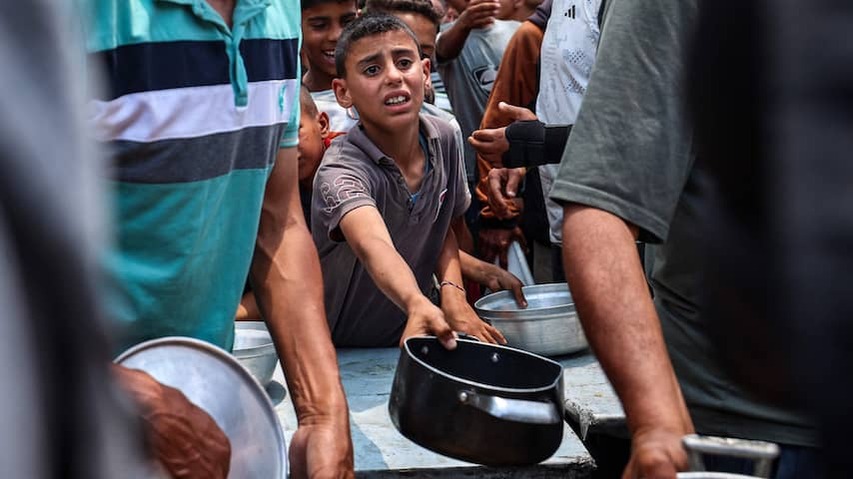
The hunger in the Gaza Strip is getting worse, mainly because almost no aid has reached the area in recent months. What is most needed now? Making a list is no longer possible. There is a shortage of everything, experts tell NU.nl.
Partly due to international pressure, Israel announced last weekend that it would allow a “basic amount” of food into the Gaza Strip. How much and what exactly remained unclear.
Meanwhile, a total of 93 trucks are said to have reached the Gaza Strip on Monday and Tuesday. This was reported by COGAT, the Israeli military agency that deals with Palestinian civilian affairs. However, UN aid organization OCHA states that the content of these trucks has hardly reached the Palestinian population. The Red Cross confirms this.
And even if it were, it is not enough. Previously, the UN and aid organizations said that at least five to six hundred trucks per day are needed to maintain aid in Gaza.
More and more Gazans are suffering from severe malnutrition and according to the World Health Organization (WHO), famine is looming. Thea Hilhorst, professor of Humanitarian Studies at Erasmus University, goes a step further. “There is already famine,” she says Wednesday in conversation with NU.nl. The Red Cross, which NU.nl also spoke to, speaks of a “nightmare from which we can no longer wake up”.
Food, Water and Medical Care
The people in Gaza currently need food, water, medical care and fuel, says Hilhorst. Daniëlle Brouwer of the Red Cross agrees. Both say that there is actually a shortage of everything. Moreover, hunger is taking on increasingly serious proportions, which also brings new problems.
“For many people, the situation is now so critical that they can no longer recover without intensive care,” says Hilhorst. The people she is referring to are so hungry that simply eating is no longer a solution. Their organs can no longer handle food. “Those people need special nutrition, and a lot of medical attention,” says Brouwer.
Hunger causes weakened people to run greater medical risks, Hilhorst explains. “If someone who is very weakened drinks contaminated water, that person can die from the diarrhea that follows. Even a simple wound can lead to death.”
In medical terms, much is also needed due to the large shortages, the Red Cross sees. “For example, suture material that is past its expiration date is still being used. And in the hospital, items are reused that we in the Netherlands only use once and then throw away. There is also scabies in Gaza now, but there are no medicines available for it.”
Because water purification plants are not running, there is little drinking water. And fuel shortages continue to cause problems. “The Red Cross still has twenty ambulances, which could actually drive back and forth non-stop. But because there is limited fuel, that doesn’t happen. As a result, the lack of fuel also costs lives.”
New Aid Has Not Yet Reached Gazans
Aid organizations, dozens of countries and also the Dutch cabinet reacted critically to the announced admission of aid by Israel this weekend.
The country says it wants to bridge the time until it has set up a new aid system, whereby Israel will carry out and control aid in Gaza itself from now on. The organization that will do this, the Gaza Humanitarian Foundation (GHF), will be responsible for so-called “safe distribution points” for food and aid.
Hilhorst and Brouwer are critical. Hilhorst finds Israel’s plan “totally irresponsible” and says that the borders to Gaza can simply be opened as quickly as possible, so that aid that is ready can enter the area. Brouwer agrees. “There are so many shortages of everything that everything that is needed should actually be brought in as quickly as possible and without limits,” she says.
Hilhorst believes that aid should be provided by existing aid organizations. “Israel says it needs about two weeks for the new system to be ready. With that, the country postpones again and avoids the simple obligation to simply open the borders,” says the professor. The Red Cross still has many questions about the plan. “For example, how do people get to those places safely? And if fighting continues, how do you guarantee the safety of people who need help?”, Brouwer wonders.
Brouwer says that aid is a profession and agrees that it should be left to aid organizations. “There are already many aid workers in Gaza who know how to do it. Leave it to those who are already there and can do it.”